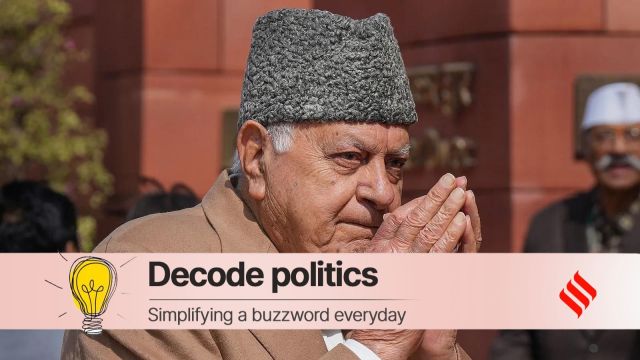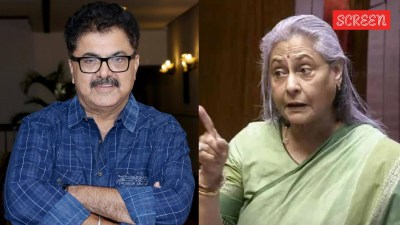On Sunday, J&K Apni Party leader and former minister Mohammad Ashraf Mir raised questions over the Jammu and Kashmir High Court’s recent decision to quash the Enforcement Directorate’s (ED) case against former Chief Minister and National Conference (NC) president Farooq Abdullah, and three others. Mir ascribed the quashing and its timing to “political motives”.
“As the J&K Assembly elections (were) announced, the High Court quashed the ED chargesheet against Farooq Abdullah. Years of investigations suddenly dismissed – right on the cue of the polls. The timing speaks volumes and suggests what is the ‘real B team’ manipulating the people of Kashmir. Dynastic parties have always worked towards their gain at the cost of J&K’s ruin,” Mir said in an X post on Sunday.

The High Court order came last week, quashing the chargesheet filed by the ED under the Prevention of Money Laundering Act (PMLA), granting relief to Abdullah and the other accused on technical grounds. The court held that the “predicate offence registered by the Central Bureau of Investigation (CBI) didn’t involve any scheduled offence under the Prevention of Money Laundering Act”. The CBI had filed the chargesheet for money laundering in the alleged Jammu and Kashmir Cricket Association (JKCA) scam.
What is the JKCA scam?
In 2012, the JKCA initiated an investigation after a report in The Indian Express that over Rs 40 crore meant for “promotion of the game” was diverted to fake JKCA accounts by members of the association.
The association said it had found that JKCA members Ahsan Mirza, a close confidant of Farooq and its treasurer from 2005 to 2011, and Administrative Secretary M Saleem Khan were diverting funds received from the Board of Control for Cricket in India (BCCI) to fake accounts. Farooq headed the JKCA at the time.
Soon after, the police registered a case under Sections 406 and 409 (criminal breach of trust) of the Ranbir Penal Code (RPC, previously in existence in J&K under the now abrogated Article 370) and Section 120B (criminal conspiracy) against Mirza and Khan.
How did Farooq Abdullah’s name come up?
Following the police case against Mirza and Khan, two cricketers filed a PIL in the J&K High Court seeking further investigations into the scam, naming Farooq as a respondent in the case.
Story continues below this ad
How did the CBI get involved?
A Special Investigation Team SIT of the J&K Police investigated the case at first. But dissatisfied with the pace of the probe, the High Court handed over the investigation to the CBI in 2015.
In 2018, the CBI filed an 8,000-page chargesheet, under Sections 120B, 406 and 407 of the RPC, against Farooq, Mirza, Khan and a bank officer. The CBI chargesheet said the JKCA had received Rs 113 crore from the BCCI between 2002 and 2011, of which Rs 43 crore was siphoned off.
What has been the role of the ED?
While the CBI was investigating the case, the ED filed a fresh case in 2019 against Farooq and others for alleged money laundering. Though Mirza approached the court against the ED’s jurisdiction in the case, his plea was dismissed. The court said that “Section 120B… when read with Sections 1(2) and 2(2) of the PMLA would fall under Part A, Paragraph I of the schedule of offences under PMLA”, thus bringing it within the ED’s purview.
The ED arrested Mirza in October 2019 and attached Farooq’s assets in Srinagar, Tangmarg and Jammu.
Story continues below this ad
Why did the High Court quash the ED chargesheet?
In 2020, Mirza again approached the High Court seeking the quashing of the complaint filed by the ED under the PMLA. It was on this challenge that the court last week announced its verdict.
In its order, the court said the “legal position enunciated by a single Bench of the court is now no longer a good law in view of the issue having been decided” by the Supreme Court in the Pavana Dibbur v The Directorate of Enforcement case in 2023. The Supreme Court had ruled that offences punishable under Section 120B of the RPC/IPC were not scheduled offences unless the alleged conspiracy was an offence specifically included in the schedule.
Finding merit in the petitioner’s argument, the High Court said: “With a view to maintain harmony and avoid contradictory stands by two investigating agencies, it is necessary that the ED respects the decision of the CBI, unless it is varied or modified by a competent court of criminal jurisdiction… The ED couldn’t be allowed to assume jurisdiction of the competent court of criminal jurisdiction and arrive at conclusions different from those arrived by the CBI, which had investigated the matter and presented the chargesheet before the Chief Judicial Magistrate of Srinagar.”
The court, however, observed that the “ED could register the Enforcement Case Information Report afresh and launch prosecution against the petitioners under Section 3 of the PMLA if ultimately the court of the Chief Judicial Magistrate, Srinagar, frames charges for offences specifically mentioned in the schedule of the PMLA.”
Story continues below this ad
What is the political impact of the High Court decision?
The ED case was a sword hanging over the senior Abdullah and a conviction in it would have kept him out of electoral politics. The quashing of the chargesheet by the High Court will give Farooq much needed relief.
“We put our case strongly before the court and we have won it. It shows that the case was falsely put on Farooq sahib,” NC spokesperson Tanvir Sadiq said. “The fact that the president of a political party was accused in a false case shows that there was more than that meets the eye.”
Sadiq, however, doesn’t see the decision as having an impact either way. “The fact is that Farooq sahib’s image was never dented by this case. The people knew it was a false case,” he said.

































